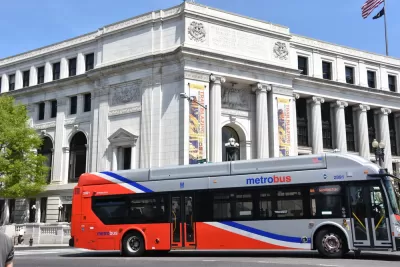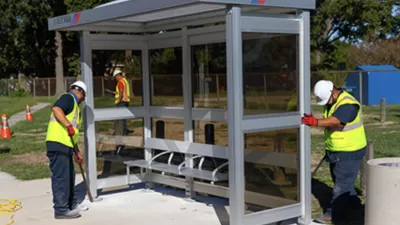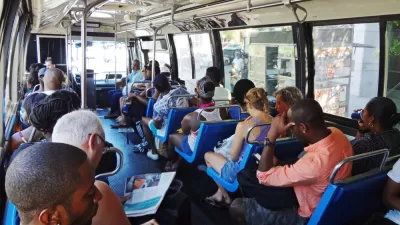Bus ridership is down in the nation's capital. Some see the issue as an opportunity to better design the service to make dollars go further.

Some officials hope to borrow lessons from Houston's redesign of its bus service to try to turn around falling ridership numbers. "It’s a strategy that is being pushed by the Washington region’s leaders, eager to see Metro seize opportunities to save money and 'right-size' service — essentially, to eliminate buses that consistently fail to run at capacity. A bus network overhaul was among the ideas recommended by former U.S. Transportation Secretary, Ray LaHood, in his recently released report on how to fix Metro’s structural and financial problems," Martine Powers writes for the Washington Post.
Why buses in D.C. are losing riders is a subject of debate, some say that now-completed train projects make that service more attractive, others point to lifestyle changes taking more people away for 9-to-5 schedules that the system was built around, and the growth of bike-share and ride-share are likely part of the equation as well.
In Houston, "officials focused on providing more frequent service throughout the day rather than clustering their efforts around the morning and evening peak periods," Powers writes. The system also moved away from a hub-and-spoke system to a grid system. "The effects on ridership are heartening: in the first year after the redesign, Saturday ridership increased by 15 percent, and Sunday service was even more popular." But some paint a less rosy picture of Houston's update, arguing that the city sacrificed equity when it cut service to areas with less ridership, which were often poor and minority.
The Houston bus redesign didn't end up saving the city money, but backers argue that boosting ridership on buses is a lot cheaper than adding transit services by any other means. They contend that, while costs went up, those dollars go further when they're spent on bus transit.

Alabama: Trump Terminates Settlements for Black Communities Harmed By Raw Sewage
Trump deemed the landmark civil rights agreement “illegal DEI and environmental justice policy.”

Study: Maui’s Plan to Convert Vacation Rentals to Long-Term Housing Could Cause Nearly $1 Billion Economic Loss
The plan would reduce visitor accommodation by 25% resulting in 1,900 jobs lost.

Planetizen Federal Action Tracker
A weekly monitor of how Trump’s orders and actions are impacting planners and planning in America.

Wind Energy on the Rise Despite Federal Policy Reversal
The Trump administration is revoking federal support for renewable energy, but demand for new projects continues unabated.

Passengers Flock to Caltrain After Electrification
The new electric trains are running faster and more reliably, leading to strong ridership growth on the Bay Area rail system.

Texas Churches Rally Behind ‘Yes in God’s Back Yard’ Legislation
Religious leaders want the state to reduce zoning regulations to streamline leasing church-owned land to housing developers.
Urban Design for Planners 1: Software Tools
This six-course series explores essential urban design concepts using open source software and equips planners with the tools they need to participate fully in the urban design process.
Planning for Universal Design
Learn the tools for implementing Universal Design in planning regulations.
Caltrans
Smith Gee Studio
Institute for Housing and Urban Development Studies (IHS)
City of Grandview
Harvard GSD Executive Education
Toledo-Lucas County Plan Commissions
Salt Lake City
NYU Wagner Graduate School of Public Service




























